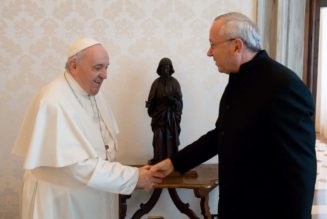
Two weeks after my 16th birthday, my father passed away. After nine months of dramatic decline from pancreatic cancer, he died surrounded by family.
I remember our last conversation. “Will you stay home from school?” he asked. “No,” was my reply. I explained that I needed to go to school because if I didn’t go, my friends would be mad at me. One of our teachers made a deal that if we all showed up for class, there would be no test. It was a sign of our estrangement in those adolescent years when I looked at him more as an object of rebellion than a source of love.
I left for school and then he slipped into a coma later that day and didn’t speak another word on earth. But he was not silent. Two days before his death, a priest came to give him last rites. “In the name of the Father, and of the Son, and of the Holy Spirit,” the priest started. Like a scene from Brideshead Revisited, my father lifted his thin, frail, veiny hand and blessed himself. It was enough for all of us present to know that the seal of faith was deeply embedded in him — that no matter what was happening to his tumor-ridden body, his soul was in the right place.
For many years, however, I remained stuck as that adolescent girl who rejected her father’s dying wish. Well into my 30s, while living in Rome, through prayer and a wonderful spiritual director, I faced my own failures, and I prayed to heal this wound in my heart.
Some of my favorite memories of my dad had been of dining out. He loved a good meal. In prayer, I felt prompted to go to dinner “with my dad.” I left the little chapel of St. Benedict in the Trastevere district of town, where the saint had his own conversion, and went to my favorite neighborhood bistro. I ordered what my dad would have ordered, a steak and a robust red wine. (I did pass on his requisite bourbon and water.)
During that meal “with him,” something happened. He told me, deep in my heart, that he forgave me, loved me and was proud of me. I sat there at that table alone, but I had never felt more un-alone. Tears streamed down my face, and something in my heart finally healed. It is no coincidence that I met my husband shortly thereafter. I needed that healing before any marriage could flourish.
In many ways, this experience has helped me to relate to the message of radical feminism, now in its third generation. At its core, it uses the tactic of convincing women that we must value the opinions of our friends above that of our fathers. It is a tactic, used since the ’60s, to effectively bring about the ultimate goal — to silence the voice of the father.
Feminism’s sisterhood has taught us — through celebrities and magazines, soaps and pop songs — to say over and over again, in all of our relationships, that it is better for us to leave than to conform our will to the will of others. Pop culture is full of the message of faux empowerment that says, “If you don’t do what I want, I will leave.” We say it first to our fathers, then to our husbands, and finally to our children. Early on, fathers and grandfathers are easily dismissed as woefully out of touch. Husbands are “encouraged” to find a way to be silent and obliging, supporting our every desire and whim. Even our children, who bring with them the demands of pregnancy, birth and infancy, can be “terminated” so as not to infringe upon our plans. This is not to say that men are in any way perfect — clearly they leave too and have their own weaknesses — but to acknowledge that this flight of women from others is a new reality and a historical anomaly.
The sisterhood has told generations of women that happiness hinges on following their lead. Tragically, but predictably, none of the metrics show that women are growing happier. Statistics on depression, suicide and substance abuse all show steady increases. Certainly, as an ideology, feminism has not delivered on its promises. It is effective, however, because it relies upon the adolescent girl in all of us — the one who doesn’t know how deeply loved she is. It tells her that she must grasp at what the world has to offer because no one is going to do it for her.
It isn’t any wonder, then, that if you look just beneath the surface, many, many men harbor bitterness toward women because of the damage they have caused in their own lives (70% of divorces are initiated by women). Many men have given up entirely on the idea of finding a good wife. The kind of wife like Adam’s, that makes him say with brimming joy, “Finally, bone of my bone and flesh of my flesh!” The kind of wife that makes him want to be a better man, and to move into the future with her, creating the warmth and comfort of a home together, through thick and thin, brimming with children and memories.
Feminism has also taught us to tell the Church that it too must conform or “we will leave.” For decades women have made their demands: that they must be able to become priests, that priests must not speak out on abortion and contraception, or that certain sections of Scripture that make us uncomfortable must not be read.
But what feminism forgets, like all rebellious adolescents, is that relationships are essential. Without them, there can be no flourishing. Women can never be happy without healthy relationships with fathers, husbands, children — and not just the kind that conform to her will, but that are in accord with human nature. Feminism has pushed out the voices we need to hear the most, silencing and disqualifying their importance in our lives. The voice of our fathers, who offer confidence and encouragement. The voice of our husbands, who offer protection, assistance and admiration. The voice of our priests — and through them, the voice of Jesus Christ — who offer absolution and wisdom. The voice of all of those who give us their unconditional love.
What we don’t hear often enough is that we don’t have to feel so bereft and hopeless. No matter how broken or troubled our relationships may be, there is still one relationship that is bigger, and vastly more important. It is a relationship that can be repaired — and when repaired, will be the source of reparation for all that is broken in our lives. It is the love of our Eternal Father, offered to us through Jesus and his cross. This is the love, known by the Magdalen and so many women throughout the ages, that supersedes every other love. It is the love that heals wounds, straightens intellects, rectifies wills, restores dignity and offers peace.
It is easy for those of us who bask in the Father’s love to forget what life is like without him, how we lived when we “left him.” But as St. Dominic taught, we are not meant to hoard the faith. We must pass it along to the tired, hurting and struggling women who believe they are doing everything right according to the sisterhood, but who find everything except happiness. We can get bogged down in the intellectual reasons for women’s departures, but at the end of the day, we must remember the human heart. And like Betty Friedan explained so many years ago, we all live with that “ache with no name” when we live apart from God.
Like prodigal daughters, we are awaited by the Father. He is watching from afar, waiting for our return to his embrace. And like my dinner in Rome, there is a meal offered every day in every Catholic church around the world that can restore our relationship with Our Father. It is the place where the Father gets to whisper that he forgives you. That he loves you. That he is proud of you.







